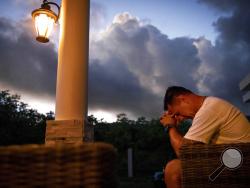AGAT, Guam (AP) — Long after clergy sex abuse erupted into scandal in the United States, it remained a secret on the American island of Guam, spanning generations and reaching to the very top of the Catholic hierarchy.
For decades, abusers held the power in a culture of impunity led by an archbishop who was among those accused. Anthony Sablan Apuron was convicted in a secret Vatican trial and suspended in 2016, after which restrictions he supported on the reporting of abuse were eased.
More than 220 former altar boys, students and Boy Scouts are now suing the U.S. territory's Catholic archdiocese over sexual assaults by 35 clergy, teachers and scoutmasters, hoping to finally see justice. The archdiocese filed for bankruptcy protection earlier this year, estimating at least $45 million in liabilities, and survivors have until Aug. 15 to file for a financial settlement.
Thousands of pages of court documents reviewed by The Associated Press, along with extensive interviews, tell a story of systemic abuse going back to the 1950s and of repeated collusion by predator priests. Seven men have publicly accused Apuron of sexual assaults they endured as children, including his own nephew.
The archbishop, now 73, denies the allegations, but in April the Vatican revealed that Pope Francis had upheld the findings of a secret church trial that he was guilty of sex crimes against children.
"He believed he was untouchable, more powerful than the governor," said Water Denton, a former U.S. Army sergeant who alleges he was raped by Apuron 40 years ago as an altar boy. "But it was me against him, and I had nothing to lose."
Though Apuron has been removed from public ministry and effectively exiled from Guam, he remains a bishop and receives a monthly $1,500 stipend from the church. The Guam archdiocese said it did not know where Apuron is, and his lawyer declined repeated requests for comment. The AP found he recently registered to vote in New Jersey, but residents at the address he listed said he doesn't live there and they don't know him.
To this day, no member of the Catholic clergy on Guam has ever been prosecuted for a sex crime, including Apuron. Secret church files that could have helped provide evidence for prosecutions are alleged to have been burned. And unlike dozens of archdioceses on the U.S. mainland, Guam has yet to issue a list of priests whom the church deems credibly accused of sexual assault.
Despite church law that requires bishops and archbishops to maintain records on sex abuse allegations, the new archbishop, Michael Jude Byrnes, said his predecessor left him nothing. He couldn't explain why, but said he had heard rumors of "a big bonfire" outside the chancery before Apuron left.
"It's horrific," Byrnes said. "The sins of the fathers are left to the children. ... It's important for the Church of Guam to confront, in a good way, the evil that we found, and to acknowledge it, and to own it."
Catholicism is deeply engrained in the culture of Guam's indigenous people, known as Chamorros. Four out of five Guamanians are Catholic. Many streets on this former Spanish colony of 165,000 are named for bishops and priests — including some now accused of sexual abuse.
Brothers Tomas and Ramon De Plata have filed suit alleging abuse by more than one priest. In March 1964, the brothers say, Apuron — then a seminarian in his late teens — was at a sleepover in the rectory. Around midnight, Ramon says, he walked into the priest's bedroom looking for the bathroom and saw Apuron and another priest engaged in sex acts with a boy from his school. Ramon says the future archbishop got up from the bed and placed a hand on his shoulder.
"He was calling me to join them," recounted Ramon De Plata, now 65 and retired from the U.S. Army. "I said, 'Don't touch me!'"
Denton says he dreamed as a 13-year-old altar boy of becoming a priest, just like Father Tony. So he felt privileged when in the spring of 1977, Father Tony invited him to spend the night before Sunday mass in the squat concrete block rectory. He says he woke up face down on bed, his legs spread, and the priest on top of him.
"I yelled, I screamed, and I begged Father Tony, 'Please stop! Please stop!'" Denton, now 55, recounted.
First, Denton told his mother what happened, but says she accused him of making it up. Denton then confided in an older altar boy, who said Apuron had abused him too. Together, Denton says they reported the assaults to another priest, but that man did nothing and later turned out to be an abuser himself.
When Guam's archbishop died in 1985, Apuron was quickly named as his successor. With him in charge, pedophile priests were protected from the top.
In August 2015, Denton reported his rape to Apuron's superior, the apostolic nuncio for the Pacific. Denton wrote a notarized four-page letter to Pope Francis, and the Vatican opened an investigation. Months ticked by.
In May 2016, a Guam survivor publicly accused Apuron of molesting him. Tired of waiting, Denton informed the church that he too was going public. The day before his scheduled press conference, Pope Francis suspended Apuron.
In a written statement issued in April, after Pope Francis rejected his final appeal, Apuron maintained his innocence but compared the decision to a death sentence.
Denton still thinks about what happened almost every day, but after decades away from the church, the former altar boy is once again attending mass.
"People ask me, 'Walter, how are you doing?'" Denton said. "And I say, 'I'm blessed. God has blessed me.'"

